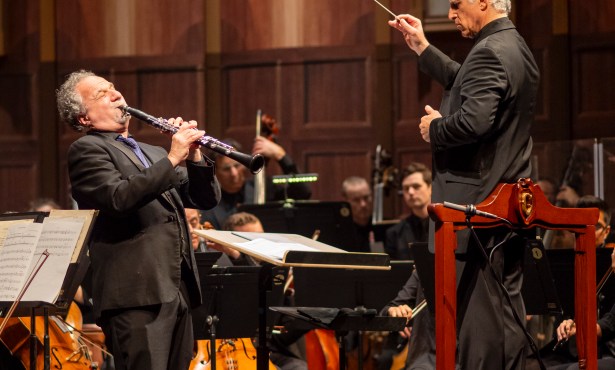Review: Henry VI, Part 3 at Westmont’s Porter Theater
National Theater of Bitola, Macedonia

The third play in Shakespeare’s trilogy on the War of the Roses and the Tudor succession often gets unfairly dismissed as a warm-up for the admittedly more accomplished Richard III. Some versions of Richard III, such as the film starring Laurence Olivier, even borrow Richard’s soliloquy from Act 3 of Henry VI, Part 3, to present a more rounded portrait of one of Shakespeare’s most memorable villains. But there is much to like, or at least admire, in this rarely produced and action-packed entry in the history-play genre, especially when it is given the kind of imaginative and exciting staging seen in this production by the National Theatre of Bitola, Macedonia.
How is it that this Macedonian company found its way to Westmont College’s Porter Theatre on a Sunday evening in November? The show was originally produced as part of the Globe Theatre of London’s Olympics festival in 2012, which featured all of Shakespeare’s plays done in as many languages, and it was this fortunate confluence of circumstances, as well as some previous experience directing in Macedonia, that put Westmont professor John Blondell at the helm as director. For those familiar with Blondell’s many wonderful Shakespeare productions with his own company, Lit Moon, at least some of the elements in this staging would be recognizable, but the Macedonian actors, who performed the show in Macedonian, brought something absolutely distinctive to the stage. The translation, the set design, the costumes, and the music were all also the work of the Macedonians.
The plot of Henry VI, Part 3 revolves around the uncertain succession of the throne of England, which is at the outset held, at least momentarily, by Henry VI’s rival, Richard Plantagenet, the Duke of York (Boris Cohorevski). The play’s first gruesomely indelible scene occurs early on, after York’s 12-year-old son, Rutland (Nikolche Projchevski), is murdered by the Lancastrian military commander Clifford (Ivan Jercic). Queen Margaret (Gabriela Petrushevska) and Clifford then taunt the captured Richard of York, first offering him his son’s bloodstained handkerchief as a tissue, and then stabbing him to death.
Under Blondell’s direction, the play’s many scenes of intense, onstage violence were stylized, but not to the point of masking the underlying rage that powers so much of the action. When in a subsequent scene Margaret’s own son, Edward (Nikolche Projchevski), is also murdered, the payback takes its place within a world in which there is no release from the cycle of violence.
As King Henry VI, Petar Gorko was terrific, wringing every conceivable color and emotion from this difficult role. In the scene where two soldiers come to him on the battlefield to report the news that, in this bloody civil war, a father has killed his son and a son has killed his father, Gorko brought home the king’s anguished response in a way that was both imperial and human.
Other outstanding performances included those of Ognen Drangovski as Edward and Valentina Gramosli as Lady Elizabeth Grey. Their passionate lovemaking in the midst of all the carnage brought a welcome balance to an otherwise death-riddled evening.
Mitko Ivanovski (percussion) and Miodrag Nećak (piano) provided a moody, jazz-tinged soundtrack that was supplemented by Drangovski’s in-character drumming and several choral interludes featuring the entire cast. The sparse staging, meant to replicate the setup at the Globe, left the focus squarely where it belonged — on these wonderfully talented actors and the stunning intensity of Shakespeare’s drama.



